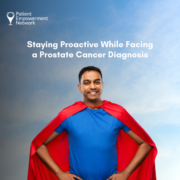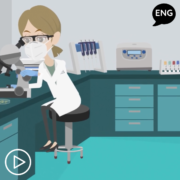Staying Proactive While Facing a Prostate Cancer Diagnosis
Patient Empowerment Network (PEN) is committed to helping educate and empower patients and care partners in the prostate cancer community. Prostate cancer treatment options are ever-expanding with new treatments, and it’s essential for patients and families to inform themselves about testing, factors in treatment decisions, treatment types, and disparities in care. With this goal in mind, PEN initiated the [ACT]IVATED Prostate Cancer program, which aims to inform, empower, and engage patients to stay abreast of the latest in prostate cancer care.
Prostate cancer is fairly common with about 13 percent of U.S. men diagnosed in their lifetime. However, prostate cancer is highly treatable when detected early, and more is now known about screening and disparities in prostate cancer. PEN is excited to add information about prostate cancer to aid in screening measures and prevention of advanced prostate cancer.
Cancer survivor Lisa Hatfield interviewed experts Dr. Yaw Nyame from Fred Hutchinson Cancer Center, Dr. Ronald Chen from University of Kansas Cancer Center, Dr. Isaac Powell from Karmanos Cancer Institute, and care partner Sherea Cary as part of the [ACT]IVATED Prostate Cancer program.
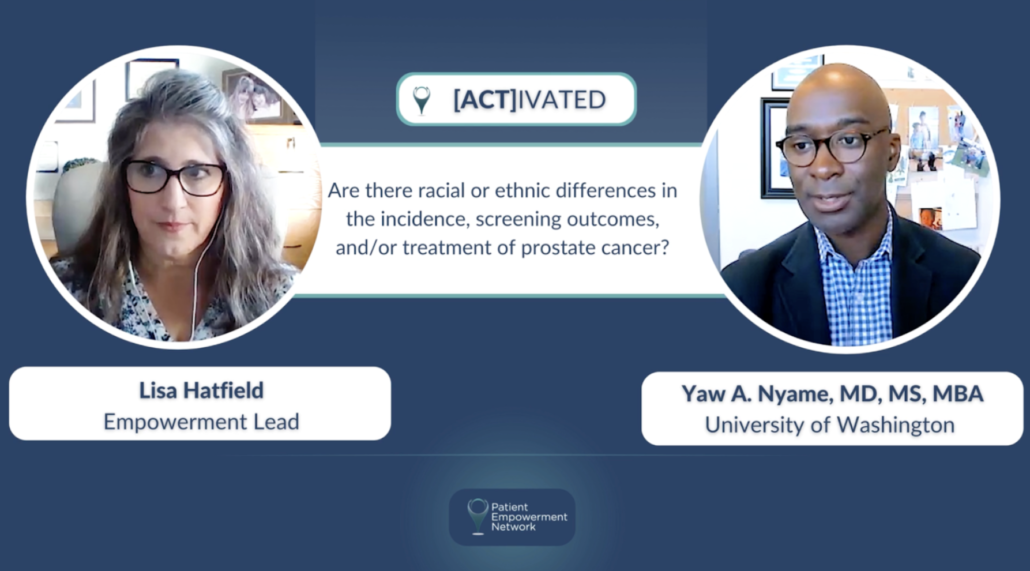
High-Risk Prostate Cancer and Population Genetics
High-risk patient groups should stick to screening recommendations for prostate cancer to help ensure early detection. Dr. Nyame shared current guidelines. “…the American Neurological Association (ANA) and the American Cancer Society (ACS) are rooted in the best available evidence and both recommend that high-risk populations which include people of African ancestry, individuals who have strong family histories of prostate cancer, so strong usually means first degree relative, grandfather, father, brother, and it’s important to remember that there’s crossover, so it’s not just prostate cancer, but if breast cancer runs in the family or colon cancer runs in the family, or cancers in general, that can put you in a high-risk category that those individuals should consider screening starting at age 40.”
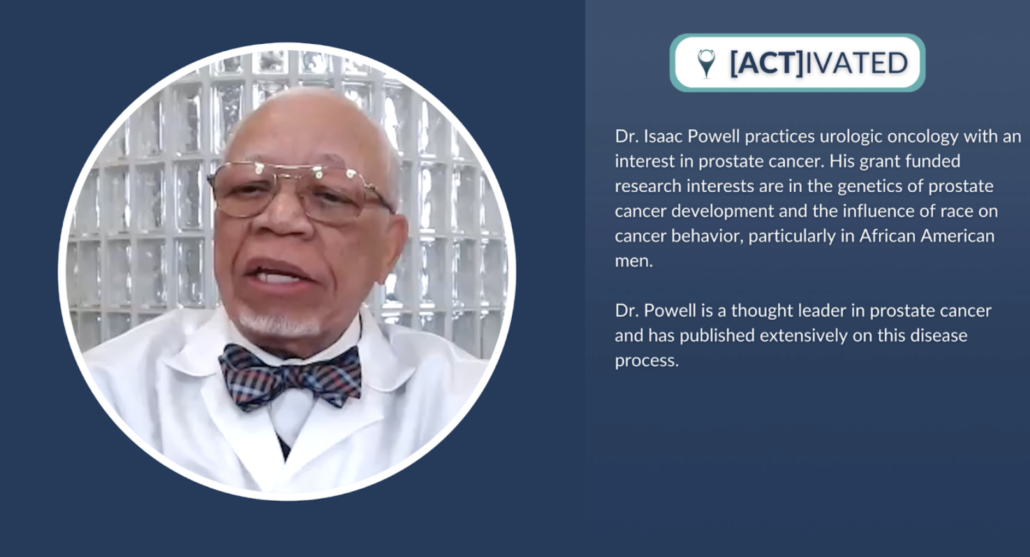
Population genetics have identified some common factors that drive aggressive prostate cancer. Dr. Isaac Powell explained some revelations of high-risk groups in West Africa, Central Africa, and Northern Europe. “So it’s the environment of West Africa, the rainforest specifically, that causes those particular diseases. Now the genetics is, in those poor inflammatory cytokines that we’ve discussed that causes prostate cancer and, in fact, other benign diseases to be more progressive, protect against these acute infections. So this is…the immune system is very complex. In some cases it protects, in some cases it drives the cancers…Northern Europe prostate cancer is more aggressive compared to Southern Europe. So it’s not just among people of color. In fact, the color makes very little difference in whether you have an aggressive cancer, particularly in Sub-Saharan West Africa as well as in European.”

Prostate Cancer Disparities and Clinical Trials Distrust
Dr. Chen discussed prostate cancer disparities in Black patients in the U.S. “And what we know is that Black patients with prostate cancer have pursued less aggressive treatment, have more delays in treatment, and are twice as likely to die from prostate cancer compared to white patients, and that’s really a large gap that we need to do more research on to close.”
The history of mistreatment of Black Americans in clinical trials has created a situation of distrust. Dr. Powell explained how the situation must be resolved. “…there’s this major distrust now that’s very difficult to eliminate in the Black community, especially if there are very few African American doctors to take care of them. So what I think that we have to fix that question of distrust, and that’s going to take a while, but I talk to them always about this mistrust issue, because I can’t see everybody, although we do need more African American doctors and nurses to take care of them and to encourage them to participate in clinical trials and to be seen as a person who is going to be taking care of them in clinical trials, that’s very important.”
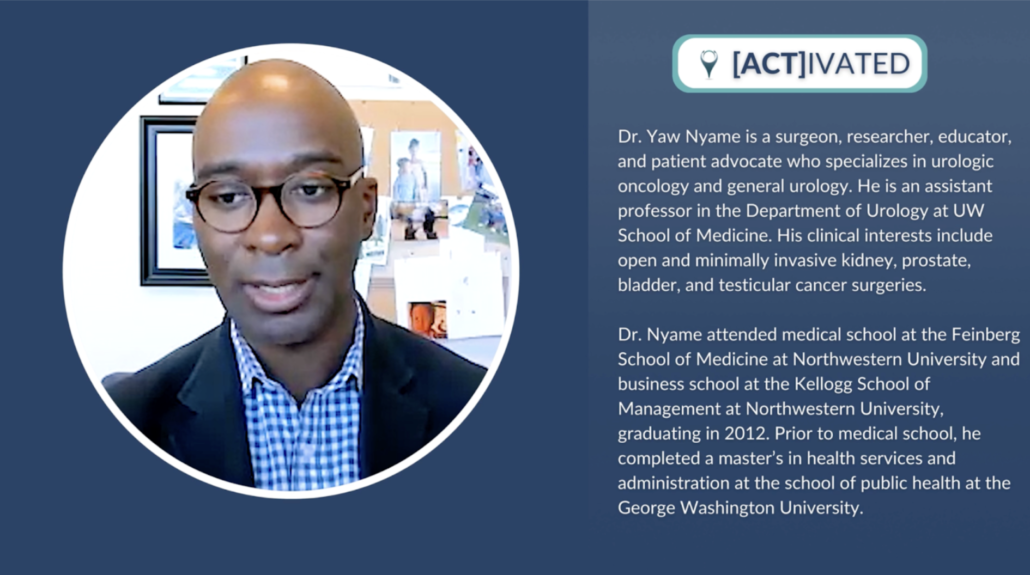
Solutions Toward Better Prostate Cancer Care
Dr. Yaw Nyame discussed solutions toward improved prostate cancer care. “…in this particular space is for Black and Latinx communities to think of ways to be partners in research and to really embrace the fact that it is their right to be at the table when we make decisions about how research is conducted, what the results of our research means and how we share those results so that they have impact in our communities. And so there are a variety of ways to be partners in research, sometimes it’s literally being part of the research team, like we do on showing up to meetings every week, and being engaged in the work in all forms, just asking to participate in the trial, being a member and a participant in the trial and making sure that your experience counts in the way we think about advancing the field of prostate cancer and making it better for everybody.”
Care partner Sherea Cary shared her perspective toward better care. “…encouraging communication, encouraging the patient to share with others, other men, what their experience has been. It seems to me that when you’re in community with other people and you have something in common, then the person who is experiencing cancer or an illness, feel a connection, if they know that someone that they know has had it and survived it and seems to be doing well, that’s encouraging to them, and then we also want that person to pay it forward.”
Empowering yourself as a patient includes gaining a clear understanding of your prostate cancer and thinking about clear goals for treatment. Dr. Yaw Nyame shared his perspective. “…when it comes to advanced prostate cancer is really thinking about what your goals of care are as a patient, meaning, what do you want to see happen in your treatment, what specific things do you want to have your doctor support? And I think understanding how to build a team that will help you support those goals of care is really important, but if you don’t know really clearly, and at least to the best of your ability, what you want to see happen in your care, I think it’s hard to then advocate for those things.”
[ACT]IVATED Prostate Cancer Program Resources
The [ACT]IVATED Prostate Cancer program series takes a three-part approach to inform, empower, and engage both the overall prostate cancer community and patient groups who experience health disparities. The series includes the following resources:
- Prostate Cancer Screening and Outcomes | Impact of Racial Disparities
- Understanding the Role of a Digital Rectal Exam in Prostate Cancer Care
- What Can Signal Hormone-Sensitive Advanced Prostate Cancer?
- Advanced Prostate Cancer Clinical Trials | Why Black and Latinx Participation Is Vital
- Prostate Cancer Clinical Trials | Is Mistrust a Barrier?
- Emerging Promising Advanced Prostate Cancer Treatments
- What Impact Does Advanced Prostate Cancer Have on Lifestyle?
- Advanced Prostate Cancer Diagnosis and Survival | Black and Latinx Disparities
- How Can Prostate Cancer Stigmas and Misconceptions Be Addressed?
- Understanding Recommended PSA Screening Age and Frequency In Prostate Cancer
- Advanced Prostate Cancer Outcomes: Addressing Disparities and Exploring Solutions
- How Can Prostate Cancer Disparity Gaps Be Overcome?
- Do Prostate Cancer Genetics Differ in African Americans?
- How Can Advanced Prostate Cancer Care Barriers Be Overcome?
- How Can Advanced Prostate Cancer Disparities Be Reduced?
- Are There Worldwide Links to Aggressive Prostate Cancer?
- [ACT]IVATED Prostate Cancer Resource Guide
- [ACT]IVATED Prostate Cancer Resource Guide en español
Though there are prostate cancer disparities, patients and care partners can be proactive in educating themselves to help ensure optimal care. We hope you can take advantage of these valuable resources to aid in your prostate cancer care for yourself or for your loved one.

